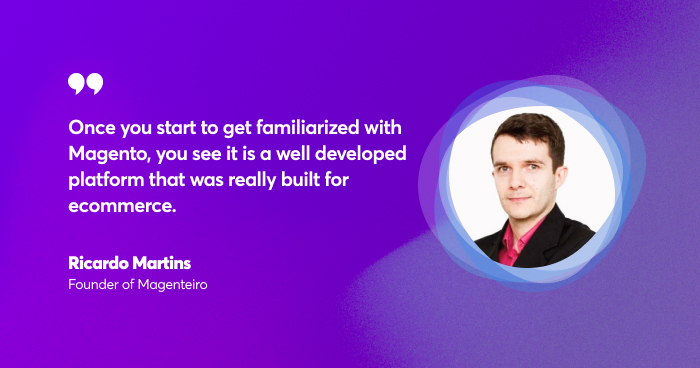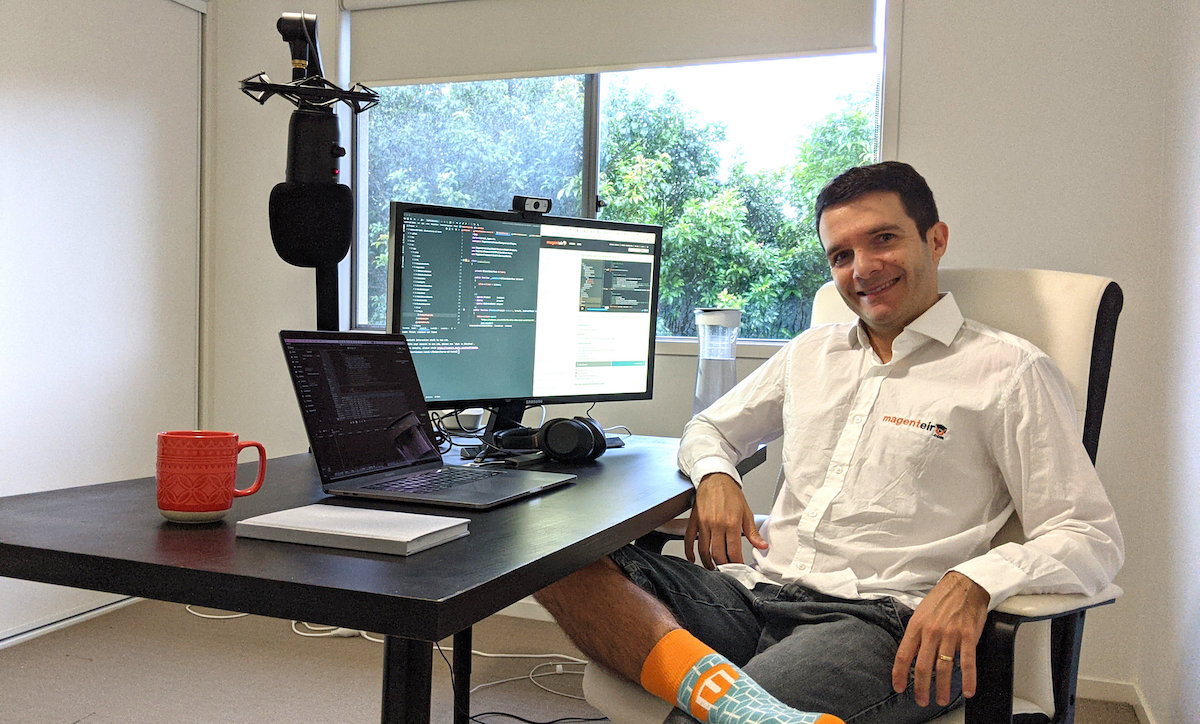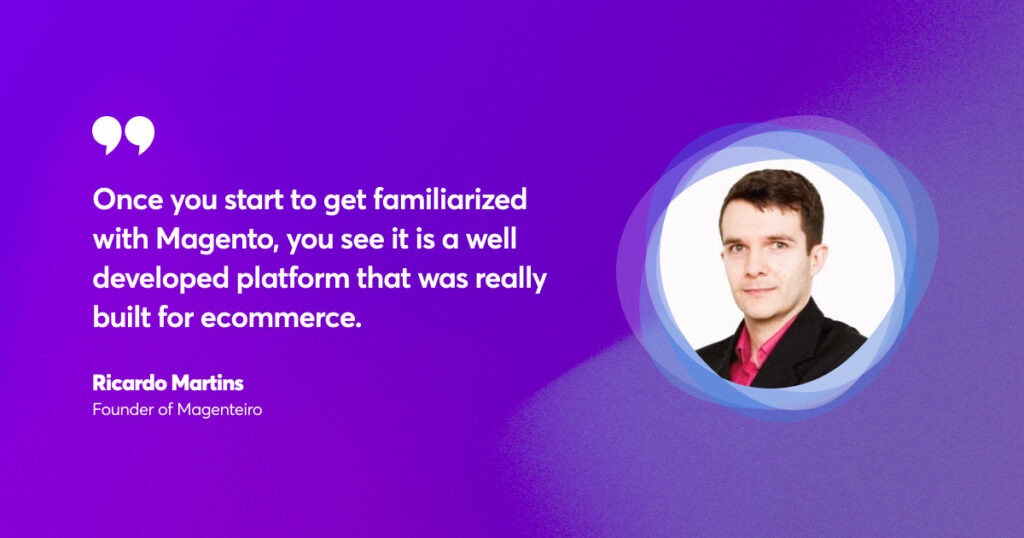
Magenterio founder Ricardo Martins has 10+ years of experience with Magento, which he shares with other Magento developers through his incredible courses. With a 4 star rating on Udemy, Ricardo’s Magento courses are a great help to 15,000+ students at beginner to intermediate level. What’s more, his module Firestore is free!
We’re thrilled Ricardo’s sharing his journey, thoughts, and life as a Magento geek with us here. Strap in!
Cloudways: Thanks for taking the time for this! To start, could you share your career highlights with our readers?
Ricardo: I’ve been a web developer since 2005, but 6 years later I met Magento. And it changed everything. With so many opportunities and challenges, I decided to create courses and modules to help other developers and store owners.
In 2017, I founded Magenteiro.com, where I host many different courses about Magento and write weekly articles. Today I work to support my students, the users of the modules I created, and to improve the company with one or two collaborators that work with me.
Cloudways: You have more than 10 years of experience with Magento. Why did you choose to work with Magento over other ecommerce platforms?
Ricardo: Well, Magento is not the easiest platform to work with. It never was. It’s hard to learn, and even harder if you don’t understand English. But once you start to get familiarized with it, you see it is a well developed platform that was really built for ecommerce.
I mean, it’s not something else that was later adapted to be an ecommerce. It was designed to be an eccommerce platform from day one. And it’s open source.
When I started with Magento, I was developing an e-commerce from scratch for myself. But when I saw the features Magento already had in it, I was amazed. And that was one of the earliest versions of it, in 2011. Now it’s much better.
Cloudways: So how would you define Magento in one line?
Ricardo: A flexible, robust and portable ecommerce platform that can be yours.
Cloudways: How did you decide to start Magenteiro?
Ricardo: When I started with Magento in Brazil, it was really hard to find any material or people that knew how it works. The lack of documentation and professionals was a huge problem. Even outside Brazil, the only thing I could find were some outdated and expensive books on Amazon.com, in English.
Most people in Brazil don’t speak or understand other languages, but they wanted to learn more about Magento. When I first launched my first course, back in 2015, I was surprised by the students’ feedback and I have never stopped since then.
Cloudways: As a Magento Instructor, what advice would you give to newbies who want to start their career in Magento development?
Ricardo: Don’t give up. It can be hard to learn and understand it. But the world needs the skills you’re about to learn. The salaries and opportunities are everywhere. And if you don’t want to work for a company, there are plenty of opportunities out there. You can help merchants and agencies with their needs, for example. Or you can create modules, themes, services and sell them in the marketplace or on a subscription basis on Magento Marketplace.
Cloudways: What are your thoughts about Magento certification? Are they really helpful? Do your courses help with achieving those certifications?
Ricardo: I don’t see the certification as good as they were before Adobe acquired Magento, but they are still very useful. It certainly helps one wanting to be hired, especially in Adobe’s partner companies.
My courses helped many Brazilian students to get their certification as well, especially the latest Magento 2: O Curso, in which they learn about Magento development. The latest version of the course is in Portuguese, but the previous version was also dubbed to English and is still valuable and helpful.
Cloudways: The new version of Magento 2.4 is out. What are your thoughts about these new Magento releases? How do you see the future of Magento?
Ricardo: The latest version shows that Adobe is keeping up with Magento, and the most recent technologies like PHP 8.1, and composer 2.x. The new features open the doors to more tools and improvements that will help store owners and developers in many different ways.
In terms of features, the best one was definitely the Page Builder. It was available only in the paid version, but is now available on Magento 2.4.3+. It allows admins to create and modify pages just by dragging and dropping components. It was a must-have feature, and now it’s available for every store.
Since Magento 2 and the end of official support of Magento 1, it seems Adobe is now focusing on medium and large businesses. The small stores are often choosing other solutions due to the lack of professionals or infrastructure costs involved in maintaining a Magento 2 store.
Part of my goals as an instructor is to make it easier for small and medium-sized businesses to enter the Magento world. It’s hard to do it alone, but it can be much easier to do it with our private community help and our courses.
I also see many small and medium companies choosing OpenMage as their platform. It’s an open source project created on top of Magento 1.9.4.5, which is the last supported version of Magento 1.x. They are keeping up with security updates, fixes, and some improvements to support earlier versions of PHP and libraries. The EOL of OpenMage is expected to happen in 2025. At that point, Magento 2 will be 10 years old and may also be discontinued in favor of Magento 3 or some other Adobe product. It can be a good option in some cases requiring less infrastructure and developer support.
Cloudways: Could you share some tips on Magento development best practices and building a successful Magento store?
Ricardo: The Magento 2 community is amazing. And there are many free tools available out there to speed up and improve our daily life as a Magento developer. In our Magento development course I share more than 10 tools I use for different purposes. Just Google it and you can find module generators, IDE plugins, PHP code checkers, and so much more.
For PhpStorm lovers for example, we have a free Magento plugin, developed by the Magento team. It helps us to create Plugins (a type of class in Magento 2), many code completion features and much more. We also offer 6 months of PhpStorm subscription for free to our Magento students.
If you are not a developer and you are planning to have a Magento store, make sure you find someone with technical skills to support you along the way. Whether it’s to update your store when a security issue is found, or to install plugins and make customizations. Unless you are using some SaaS solution, you must have someone available to help you. The simple tasks can be challenging in Magento and demand more time than you have available. After all, you must focus on what is important to your business.
Cloudways: What do you think of the Magento community? How would you summarize the Magento community in one word?
Ricardo: Huge.
I attended many Magento events in Brazil, and even in Las Vegas (US) and Australia. Back in 2012, when I presented at the first Meet Magento in São Paulo I remember how vibrant and friendly the community was and how it impacted me in a positive way.
Even the core “star” developers are easy to reach and are open to suggestions most of the time. It’s not hard to find one in the official events and happy hours. There are also big communities on many different platforms. Slack, Discord, Facebook, Whatsapp, you name it. Even the core team can be found in some of those communities.
In our private group at Magenteiro, I often save my time answering students’ questions. Most of the time someone else answers the questions better than I would, and I learn a lot with my students. Some of them work with Magento on a daily basis more than I do.
Cloudways: And what are your views on Magento events? How important are these events for the growth of Magento?
Ricardo: Magento events played a big role in the way I feel about it. There are many community driven events – I mean events created by the community. Those are usually the best. They are informal, and smaller than the official events. But you can talk to most of the people attending.
They are a good way to see what’s happening, share thoughts about Magento and meet people that will probably work with you years later.
Cloudways: How do you balance your work-life balance? Do you like sports, traveling, entertainment, or hanging out with friends and family?
Ricardo: Magenteiro and some other Magento projects allow me to work full time from home and to have a huge flexibility. I love to run every other day, and every year I attend the “You vs. The Year” challenge. This year’s goal is to run 1022 Km or more. I always do my workouts after work, no matter how cold it is, or even when it’s raining. And I can’t do it without a few good podcasts episodes on my ears.
Working from home is awesome, and allows me to stay closer to my wife and see my two little girls growing up every day. I thank God every day for that.
Cloudways: Every one of us likes to follow some influencers. From whom do you get inspiration?
Ricardo: When I started with Magento, Ben Marks was certainly one of the top developers and evangelists of that time. I appreciated and followed lots of his work back then.
Today I’m more focused on helping other students and developers to learn Magento, and in finding balance between my professional and personal life. People like Amy Porterfield, James Wedmore and Marie Forleo are among the people I listen to in my weekly workouts and some of the people I learn how to do it better.
In the Magento world, I got inspired by my students and what they do and develop. I’m always receiving feedback from them on what they are doing, and that inspires me to learn new things in order to help them.
Cloudways: Would you prefer shared hosting for Magento stores or a cloud hosting environment like Cloudways offers?
Ricardo: Although I have a technical background and understand how Magento works, I’m not so comfortable with infrastructure. I also don’t want to spend too much of my time fixing its problems. That’s why I usually use and recommend finding a Magento specialized hosting. This way you can focus on your business needs, and if something goes wrong when you are away from the computer, you can always send an email to someone to get it fixed for you.
Also, when a hosting company is specialized in Magento, they often know how to fix common infrastructure problems related to Magento or even security issues a Magento store may face in the future.
Of course, if you are a big player and have dedicated people for that matter in your team, you
may prefer to do it yourself and according to your needs. Cloudways is a good option for Magento specialized hosting and can also help users to skip some steps of installation.
Cloudways: Finally, would you like to share a picture of your workplace?
Ricardo: Sure. We just bought our first home in Australia, but the old office wasn’t too different from this one. I always do my best to deliver the best video and audio quality for my students.

Start Creating Web Apps on Managed Cloud Servers Now
Easy Web App Deployment for Agencies, Developers and E-Commerce Industry.
Abdur Rahman
Abdur Rahman is the Magento whizz at Cloudways. He is growth ambitious, and aims to learn & share information about Ecommerce & Magento Development through practice and experimentation. He loves to travel and explore new ideas whenever he finds time. Get in touch with him at [email protected]
